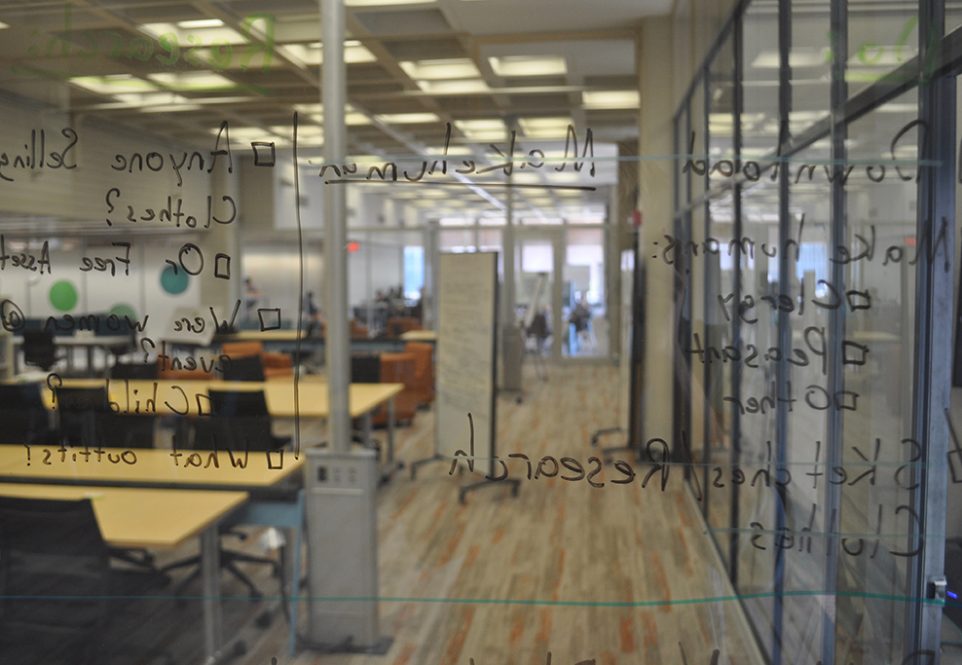On Level 1 of the Homer Babbidge Library there is a bright, glass-walled research area that has spent the last five years developing a revolutionary workspace for scholarship that reaches across disciplines and into the community.
Greenhouse Studios, started in 2016 using a planning grant from the Andrew W. Mellon Foundation, emphasizes an egalitarian workflow that produces unique digital collaborations. Each project at Greenhouse Studios brings together diverse interdisciplinary teams of researchers, including scholars, artists, librarians, and technical specialists.
Greenhouse Studios aims to transgress barriers that keep academic work, which is often confined to books and journal articles, from benefitting broader communities by investigating new ways of producing and sharing knowledge.
Greenhouse Studios associate director of research Clarissa Ceglio, director Tom Scheinfeldt, and associate director Sara Sikes recently published an article in the Journal of Scholarly Publishing outlining some of their major takeaways from the first years of the Greenhouse Studios experiment.
The team hopes Greenhouse Studios can serve as a model for other universities, academic presses, and other traditional sources of scholarship looking to update their methods of knowledge production and dissemination.
“Greenhouse Studios’ process model offers an idea of how universities can take advantage of all the talent on campus,” Scheinfeldt says. “How can we make use of all the human resources and brain power — students, faculty, and staff — available to us at these amazing places we call universities?”
The work at Greenhouse Studios starts with people first. Everyone who works on a project is at the table from day one rather than bringing on team members like developers or designers late in the process, a common feature of many collaborations.
The team begins the inquiry-driven process by considering how they can best leverage their unique individual and collective skill sets to address a prompt (such as “the limits of text” or “humility and conviction in public life”), a problem, or set of primary sources.
“Everyone is at the table at the outset, which means each member, no matter their disciplinary home, has a part in shaping the questions and concerns that guide the research and, ultimately, the impact that the finished work will have out in the world,” Ceglio says.
Greenhouse Studios’ approach to scholarship disrupts established academic hierarchies which typically value faculty-associated disciplinary skills over those of librarians, students, technology specialists, and others with different forms of expertise.
“Everyone who works on the project has an equal stake in it,” Sikes says. “It’s really a range of different skill sets that are coming together in new ways to inform our research initiatives and project teams.”
The team that started Greenhouse Studios developed a novel five-phase process. They surveyed people, including managers, graduate assistants, designers, scholars, and librarians, who had worked in different roles on collaborative projects.
We set down to imagine a place where those different disciplines, those different approaches to knowledge creation could work together to imagine new ways of doing scholarly work. — Tom Scheinfeldt
They found many of these people had similar processes but used different language to describe their approaches. The team developed a model that uses neutral language intelligible to people in all disciplines and roles.
“We set down to imagine a place where those different disciplines, those different approaches to knowledge creation could work together to imagine new ways of doing scholarly work,” Scheinfeldt says.
The past few years have essentially been a test of this hypothesized model for collaboration. As the team discusses in their paper, so far, it’s been a remarkable success.
Since its founding, Greenhouse Studios has attracted several million dollars in external funding for its projects. It has been gradually expanding its staff and the number of projects it can pursue, which translates to tangible benefits for project members and the community.
Each collaboration with a press is a unique experience based on the specifics of what the project needs and the communities it seeks to engage. Projects often include virtual reality components, card games, films, and other unique elements most university presses have never worked on before.
These projects maintain a focus on helping their intended communities whether by inspiring conversations about Christianity’s relationship to political tribalism, or understanding how migrant communities in Hartford formed and were shaped.
Greenhouse Studios works with academic publishers, including a close collaboration with the University of Massachusetts Press. Academic publishers work comfortably in traditional print mediums but, in the increasingly digital and interdisciplinary landscape, many are looking to expand how they share information.
“It’s a way of partnering and collaborating and ultimately doing what universities are meant to do–increase and disseminate knowledge for the benefit of local, national, and global communities,” Ceglio says.



